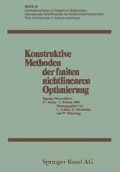Abstract
Are Fixed Point Methods effective ? In this paper, we discuss the efficiency of modern fixed point methods. Our investigations concentrate on two special situations: First, we consider problems with “well — behaved” functions and demonstrate that the efficiency in such cases is comparable to that of Newton’s method. In the second place, we consider “wild” functions such that Newton’s method cannot even be formulated, to say nothing of good convergence results. Even in such situations fixed point methods may have linear convergence properties. To sum up, modern fixed point methods have (in contrast to older formulations) convergence properties which make them a valuable tool in numerical analysis.
Access this chapter
Tax calculation will be finalised at checkout
Purchases are for personal use only
Preview
Unable to display preview. Download preview PDF.
Literaturverzeichnis
Allgower, E., Georg, K.: Simplicial and Continuation Methods for Approximating Fixed Points and Solutions to Systems of Equations. SIAM Review, to appear
Kuhn, H.W.: Simplicial Approximation of Fixed Points. Proc. Nat. Acad. Sci. USA, 61, 1238 – 1242 (1968)
Kuhn, H.W.: Approximate Search for Fixed Points. In: Computing Methods in Optimization Problems 2, New York: Academic Press, 1969
Lüthi, H.-J.: Komplementaritäts- und Fixpunktalgorithmen in der mathematischen Programmierung, Spieltheorie und Ökonomie. Lecture Notes in Economics and Mathematical Systems Nr. 129. Berlin — Heidelberg — New York: Springer, 1976
Merrill, O.H.: Applications and Extensions of an Algorithm that Computes Fixed Points of Certain Upper Semi — Continuous Point to Set Mappings. Ph. D. Dissertation, Michigan, 1972
Peitgen, H.-O., Prüfer, M.: The Leray — Schauder Continuation Method is a Constructive Element in the Numerical Study of Nonlinear Eigenvalue and Bifurcation Problems. In: Springer Lecture Notes in Mathematics, Band 730, Peitgen, H.-O. und Walther, H.-O edrs.; Berlin-Heidelberg-New York 1979
Saigal, R.: On the Convergence Rate of Algorithms for Solving Equations that are Based on Methods of Complementary Pivoting. Math. Op. Res. 2, 108 – 124 (1977)
Scarf, H.E., Hansen, T.: Computation of Economic Equilibria. New Haven: Yale University Press, 1973
Schwetlick, H.: Numerische Lösung nichtlinearer Gleichungen. Berlin: Deutscher Verlag der Wissenschaften, 1979
Shoven, J.B., Whalley, J.: A General Equilibrium Calculation of the Effects of Differential Taxation of Income from Capital in the U.S. J. Publ. Econ. 1 (1972)
Todd, M.J.: The Computation of Fixed Points and Applications. Lecture Notes in Economics and Mathematical Systems, vol. 124. Berlin — Heidelberg — New York: Springer, 1976
Walras, L.: Élements d’économie politique pure ou théorie de la richesse sociale. Lausanne: Corbaz, 1874
Editor information
Editors and Affiliations
Rights and permissions
Copyright information
© 1980 Springer Basel AG
About this chapter
Cite this chapter
Cromme, L.J. (1980). Sind Fixpunktverfahren Effektiv?. In: Collatz, L., Meinardus, G., Wetterling, W. (eds) Konstruktive Methoden der finiten nichtlinearen Optimierung. International Series of Numerical Mathematics / Internationale Schriftenreihe zur Numerischen Mathematik / Série internationale d’Analyse numérique, vol 55. Birkhäuser, Basel. https://doi.org/10.1007/978-3-0348-6322-3_3
Download citation
DOI: https://doi.org/10.1007/978-3-0348-6322-3_3
Publisher Name: Birkhäuser, Basel
Print ISBN: 978-3-0348-6323-0
Online ISBN: 978-3-0348-6322-3
eBook Packages: Springer Book Archive

